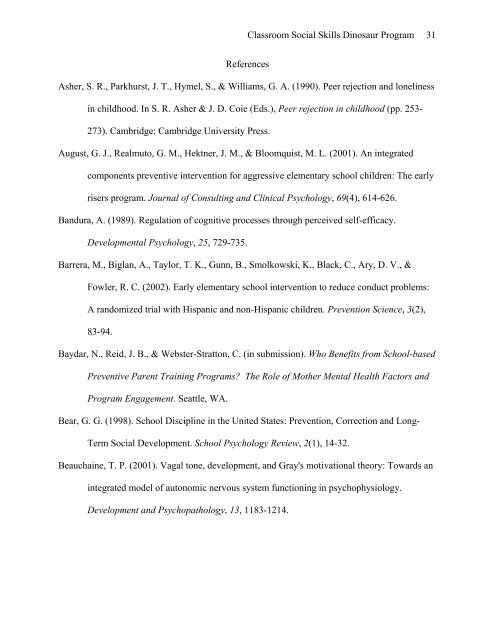Classroom Social Skills Dinosaur Program 1 Running head ...
Classroom Social Skills Dinosaur Program 1 Running head ... Classroom Social Skills Dinosaur Program 1 Running head ...
Classroom Social Skills Dinosaur Program 30 all children in the classroom, several times per week, throughout the school year. In this way, young children are provided with the language and skills to cope effectively with emotions and problems that arise in their everyday lives. Preliminary results and experience with the program in over 40 Head Start, kindergarten, and grades one and two classrooms suggests the program is highly regarded by teachers, parents, and children alike and is showing promising social and academic improvements. Dinosaur School is a comprehensive program that simultaneously works to eliminate disruptive child behaviors and to foster prosocial behaviors. Ideally it would be used in conjunction with the parent program and teacher classroom management training programs so that parents and teachers are consistently reinforcing the newly learned social behaviors at home and school. As with any intervention, this program is most effective when provided with high fidelity, upholding the integrity of the content, process, and methods.
Classroom Social Skills Dinosaur Program 31 References Asher, S. R., Parkhurst, J. T., Hymel, S., & Williams, G. A. (1990). Peer rejection and loneliness in childhood. In S. R. Asher & J. D. Coie (Eds.), Peer rejection in childhood (pp. 253- 273). Cambridge: Cambridge University Press. August, G. J., Realmuto, G. M., Hektner, J. M., & Bloomquist, M. L. (2001). An integrated components preventive intervention for aggressive elementary school children: The early risers program. Journal of Consulting and Clinical Psychology, 69(4), 614-626. Bandura, A. (1989). Regulation of cognitive processes through perceived self-efficacy. Developmental Psychology, 25, 729-735. Barrera, M., Biglan, A., Taylor, T. K., Gunn, B., Smolkowski, K., Black, C., Ary, D. V., & Fowler, R. C. (2002). Early elementary school intervention to reduce conduct problems: A randomized trial with Hispanic and non-Hispanic children. Prevention Science, 3(2), 83-94. Baydar, N., Reid, J. B., & Webster-Stratton, C. (in submission). Who Benefits from School-based Preventive Parent Training Programs? The Role of Mother Mental Health Factors and Program Engagement. Seattle, WA. Bear, G. G. (1998). School Discipline in the United States: Prevention, Correction and Long- Term Social Development. School Psychology Review, 2(1), 14-32. Beauchaine, T. P. (2001). Vagal tone, development, and Gray's motivational theory: Towards an integrated model of autonomic nervous system functioning in psychophysiology. Development and Psychopathology, 13, 1183-1214.
- Page 1 and 2: Classroom Social Skills Dinosaur Pr
- Page 3 and 4: Classroom Social Skills Dinosaur Pr
- Page 5 and 6: Classroom Social Skills Dinosaur Pr
- Page 7 and 8: Classroom Social Skills Dinosaur Pr
- Page 9 and 10: Classroom Social Skills Dinosaur Pr
- Page 11 and 12: Classroom Social Skills Dinosaur Pr
- Page 13 and 14: Classroom Social Skills Dinosaur Pr
- Page 15 and 16: Classroom Social Skills Dinosaur Pr
- Page 17 and 18: Classroom Social Skills Dinosaur Pr
- Page 19 and 20: Classroom Social Skills Dinosaur Pr
- Page 21 and 22: Classroom Social Skills Dinosaur Pr
- Page 23 and 24: Classroom Social Skills Dinosaur Pr
- Page 25 and 26: Classroom Social Skills Dinosaur Pr
- Page 27 and 28: Classroom Social Skills Dinosaur Pr
- Page 29: Classroom Social Skills Dinosaur Pr
- Page 33 and 34: Classroom Social Skills Dinosaur Pr
- Page 35 and 36: Classroom Social Skills Dinosaur Pr
- Page 37 and 38: Classroom Social Skills Dinosaur Pr
<strong>Classroom</strong> <strong>Social</strong> <strong>Skills</strong> <strong>Dinosaur</strong> <strong>Program</strong> 31<br />
References<br />
Asher, S. R., Parkhurst, J. T., Hymel, S., & Williams, G. A. (1990). Peer rejection and loneliness<br />
in childhood. In S. R. Asher & J. D. Coie (Eds.), Peer rejection in childhood (pp. 253-<br />
273). Cambridge: Cambridge University Press.<br />
August, G. J., Realmuto, G. M., Hektner, J. M., & Bloomquist, M. L. (2001). An integrated<br />
components preventive intervention for aggressive elementary school children: The early<br />
risers program. Journal of Consulting and Clinical Psychology, 69(4), 614-626.<br />
Bandura, A. (1989). Regulation of cognitive processes through perceived self-efficacy.<br />
Developmental Psychology, 25, 729-735.<br />
Barrera, M., Biglan, A., Taylor, T. K., Gunn, B., Smolkowski, K., Black, C., Ary, D. V., &<br />
Fowler, R. C. (2002). Early elementary school intervention to reduce conduct problems:<br />
A randomized trial with Hispanic and non-Hispanic children. Prevention Science, 3(2),<br />
83-94.<br />
Baydar, N., Reid, J. B., & Webster-Stratton, C. (in submission). Who Benefits from School-based<br />
Preventive Parent Training <strong>Program</strong>s? The Role of Mother Mental Health Factors and<br />
<strong>Program</strong> Engagement. Seattle, WA.<br />
Bear, G. G. (1998). School Discipline in the United States: Prevention, Correction and Long-<br />
Term <strong>Social</strong> Development. School Psychology Review, 2(1), 14-32.<br />
Beauchaine, T. P. (2001). Vagal tone, development, and Gray's motivational theory: Towards an<br />
integrated model of autonomic nervous system functioning in psychophysiology.<br />
Development and Psychopathology, 13, 1183-1214.



